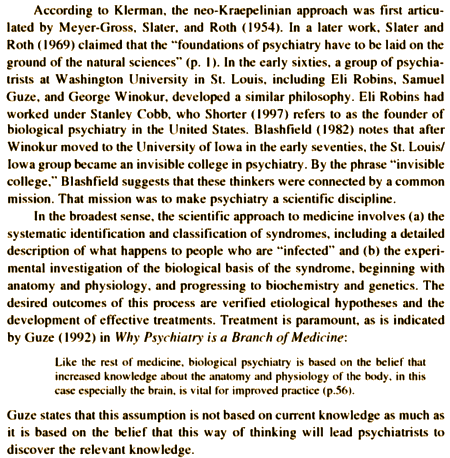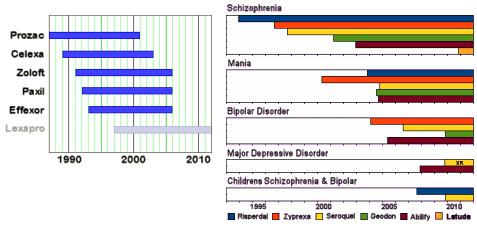| An illusion is not the same thing as an error; nor is it necessarily an error. …we call a belief an illusion when a wish-fulfilment is a prominent factor in its motivation, and in doing so we disregard its relations to reality, just as the illusion itself sets no store by verification. |
| Sigmund Freud: The Future of an Illusion 1927 |

The revision of the Diagnostic and Statistical Manual of Mental Disorders in 1980 was more like the Treaty of Versailles at the end of World War I than any consensus of psychiatric thought about diagnosis. Psychiatry had always had Diseases, at least since Emil Kraepelin early in the century – Schizophrenia, Manic-Depressive Illness, Melancholia, etc – the classic psychiatric syndromes. These illnesses were accepted as medical model conditions by most – a collection of signs and symptoms, a somewhat predictable course, the suggestion of genetic factors in family histories, biological approaches to treatment, and something of a consensus that there would come a day when a a biological substrata would be identified. In my mind, these were the Kraepelinian Diseases.
For a variety of reasons, there was a need to purge psychiatry of psychological causation and move to a medical model for the non-Kraepelinian mental illnesses too. The DSM-III did that – lists of symptoms gathered into syndromes called Disorders with no mention of etiology, analogous to or equated with medical diseases.. There was a powerful injunction to eliminate the psychoanalytic concept of neurosis. So in the process of translating the version of syndromes in the DSM-II, there were some odd compromises. The classic Kraepelinian Depression [Melancholia] and the more Freudian Depressive Neurosis were rolled into one category – Major Depressive Disorder. Additionally, the Kraepelinian Manic Depressive Disorder was expanded to cover a greater cohort than before.

I would guess that any new paradigm begins with some level of illusion and banks on the future. Likewise, students of the history of science bank on the rise and fall of scientific paradigms for thesis topics guaranteed to insure graduation. It’s easy to see the failings of the last new great idea when you’re in possession of the next one – the promise of the future trumps the tarnished glory of the past. In addition, the late arrivals to the "old ways" had come at a time when the warts were already showing, and weren’t so enraptured as their predecessors. Aaron Beck, featured speaker at the coming APA, was such a person – a psychoanalyst who changed directions and created Cognitive Behavior Therapy. Two others have already been mentioned in this post – Robert Spitzer and Allen Frances, both graduates of the Columbia Psychoanalytic Institute, both of whom went on to make valuable contributions to the new psychiatry as the principle architects of the DSM revisions that introduced and sustained it. I expect that being in on the downside of an earlier paradigm imparts some wisdom and perspective that carries over to the next. But the future graduate theses about neo-Kraepelinian psychiatry will unlikely follow the typical formula of paradigm ascendency ultimately ending with paradigm exhaustion. There will be a section in the middle about unprecedented scientific corruption that alters the plot line and turns it into something more like a dark summer beach thriller than science docudrama.
Did the DSM-III cause the corruption? Or was it influenced secretively by the Pharmaceutical Industry that took such advantage as the story has played out? I’m told by people who should know that neither was the case, and I have no reason for doubts – but I don’t personally know. But the DSM-III and the resultant changes in psychiatry certainly opened the door wide for the possibility. The next full revision, the DSM-IV, was published in 1994 having been in the works for several years before. Here are some of my old slides showing the timelines of the FDA drug approvals:

By 1994, should the framers of the DSM-IV have known about the deceitful science that would flood psychiatry journals and co-opt so many psychiatrists that was coming? Could they have known? Did they know? What they did know was that Pharmaceutical Industry money was flowing into psychiatry departments at very welcomed rates. I think back then, it was seen as a healthy alliance between academia and industry forged for the greater good. The Clinical Research Industry was in its infancy. By 1994, the enthusiasm for the SSRIs had not yet waned, though we know that the safety and efficacy issues were being questioned against a heavy defense. From my fly-on-the-wall position, two things stand out in memory. First, I heard Dr. Richard Borison give a presentation in the mid-1980s and immediately identified him as a "bought man" [which he turned out to be, busted in 1996]. The fact that our new chairman thought he was great had something to do with my own exodus from academia. Second, I was in Atlanta Georgia. I heard the story that Dr. Charles Nemeroff took his opening tour of facilities as chairman at Emory in a chauffeured Rolls Royce; I looked over his voluminous Curriculum Vita which was circulated; and I met him – all in 1991. The Richter Scale reading was well over 7.0. But those were local experiences and I never generalized those perceptions myself to be as ominous as they turned out to be.
The political force behind DSM-III was the American Psychiatric Association, aided and abetted by the Administrator of ADAMHA, Gerald Klerman. Your quote from Allen Frances about Robert Spitzer saving psychiatry as a medical specialty is on target. The political goal and process were dressed up as science but the product DSM-III was not a work of science.
Especially telling is the silence of DSM-III on the issue of treatment. Everybody could continue doing exactly what they had been doing without interference from the new nosology – and their ability to bill for services was more secure. As for the claim that DSM-III set the stage for a research revolution, in the field of mood disorders it set the stage rather for a quagmire. It encouraged a thoughtless heterogeneity of ‘depression’ and threw away hard won clinical research insights about important subtypes of depression. The ensuing 30 years of research on Major Depression were crippled by this strategic blunder. Pharma later joined the party in happy pursuit of mass marketing. That is an explanation for the now lamented empty pipeline.
I just wanted to say the that when the various drugs are approved for use in children seems to have little to no relationship with whether or not they are used in children. My son was prescribed Risperdal in 1995—more than a decade before it was approved for pediatric use for any diagnosis—it is still not approved for pediatric use for the reason it was prescribed to my son in 1995. What is troubling to me as a parent is the fact that never was I informed that this drug, or any other drug he was prescribed had not in fact been tested or approved for use in children. This has been going on for decades…The betrayal of trust that lack of adequate and appropriate information—It is simply criminal that children are being prescribed psychiatric drugs ‘off-label’—-All of the psychiatric drugs are minimally efficacious—for a minority of patients—with the diagnoses the drugs were developed to treat! This being the case, WHY has it become Standard Practice to use teratogenic drugs for behaviors which are caused by poverty and malnutrition, neglect and/or abuse and ineffective parenting. The drugs cause iatrogenic diseases–that is a fact—yet the drugs are prescribed in Standard Practice because the Practice Parameters and Treatment protocols and algorithms recommend the drugs be used indiscriminately, off-label…In spite of the fact there is not valid empirical evidence to support the ‘treatment’ recommendations— This is unethical, it is not Evidence Based Medicine; it is Human Experimentation. Calling it a ‘Standard Practice’ is misleading—as it implies that the drugs became recommended as ‘standard treatment’ due to the empirical data from clinical trials. In psychiatry, this is not the case. Much of the research in psychopharmacology for decades, it seems to me has been done in an effort to support and validate what was in fact already being done in clinical practice with no science to validate the widespread use of pharmacological drugs to treat psychiatric diagnoses—-obviously backwards. Bio-maniacal ‘psycho’ pharmacologists continue to use these standards, and recommend that other medical professionals use them claiming they are Evidence Based—after repeated attempts to validate them have failed—-it is apparent it is not evidence-based medicine, just Standard Practice. Obviously, this is not done with concern for what is in any patient’s ‘best interest’ it is clearly not Evidence Based. Perhaps it is evidence of how entrenched the illusion has become.
Yes, Becky. And to top it off the psychiatrists and prescribing nurses are not following up on patients. If someone who receives a prescription just stops showing up and makes no further appointments there is no effort whatsoever on the part of the professional who prescribed the mind altering drug(s) to contact the patient for a follow-up.
.
Paula Caplan has an editorial about the DSM-5 in the Wash Post: http://www.washingtonpost.com/opinions/psychiatrys-bible-the-dsm-is-doing-more-harm-than-good/2012/04/27/gIQAqy0WlT_story.html
I think her point that the DSM serves no real purpose but to reassure psychiatry that it is a systematic and scientific venture is a valid one.
Your descriptions of the history of the DSM’s should be required reading in all psychiatry residency programs.
Allow me to backtrack a few weeks. Mickey, you may be interested to know that Robert Gibbons appears here: http://the-scientist.com/2012/05/01/data-diving/